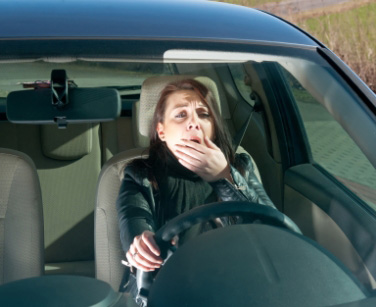How to steer clear of drowsy driving
Chris Kissell
Every motorist knows the feeling – you’re tired, and somewhere in the midst of a long, monotonous drive, you begin to drift off to sleep. Those few seconds of inattention may seem harmless, but they can be life-threatening.
More than 100,000 crashes a year can be attributed to drowsy driving, according to the National Highway Traffic Safety Administration. Such accidents result in 40,000 injuries and 1,550 deaths each year. And the numbers actually may be worse, says John Ulczycki, vice president of the National Safety Council.
 “Drowsy driving is an issue that is likely grossly under-reported in official statistics,” Ulczycki says. “Law enforcement officers at crash scenes cannot always determine to what extent drowsy driving was a causal factor.”
“Drowsy driving is an issue that is likely grossly under-reported in official statistics,” Ulczycki says. “Law enforcement officers at crash scenes cannot always determine to what extent drowsy driving was a causal factor.”
It’s easy to fall asleep behind the wheel – with disastrous consequences, says David Reich, a spokesman for the National Road Safety Foundation. Sleep-deprived people may go into micro-sleep, a period of a few seconds when the brain partially shuts down, he says.
“Dozing for even three or four seconds at highway speeds can prove fatal,” Reich says. “During that short period, a car traveling 60 miles per hour will cover the length of a football field.”
Reich says that’s plenty of time to plow into a vehicle at full speed, veer into an oncoming lane, or careen off the road and into a tree.
“We have heard too many instances of people trying to drive while fatigued, only to crash within a few miles of their destination,” Reich says.
Danger signs
The National Sleep Foundation is trying to raise awareness of these dangers by designating Nov. 12 to 18 as Drowsy Driving Prevention Week.
A 2011 National Sleep Foundation poll found that 37 percent of drivers admitted to driving while drowsy in just the previous month, says foundation spokeswoman Jennifer Williams.
“What many don’t realize is that when you’re really tired, you can fall asleep for just a few seconds and not even realize it,” she says. “You can’t just will yourself awake.”
If you are driving tired, certain behaviors may indicate you’re at risk of falling asleep behind the wheel. They include:
- Difficulty focusing.
- Yawning or blinking frequently, or rubbing your eyes.
- The feeling of heavy eyelids.
- Wandering, disconnected thoughts.
- Difficulty remembering the last few miles driven.
- Missing exits or traffic signs.
- Trouble keeping your head up.
- Drifting from your lane or hitting a shoulder rumble strip.
- Tailgating other cars.
- Feeling restless and irritable.
However, Ulczycki says, it’s a mistake to think you’re not in danger of falling asleep until these signs appear. “By the time you get to that point, it probably is too late to prevent it,” he says.
Reich says some “cures” that people use to combat drowsiness once they’re on the road don’t work. “Playing the radio loudly or opening the window for fresh air will not prevent a micro-sleep,” he says.
Instead, it’s better to be proactive before you get behind the wheel, Ulczycki says.
“The real answer is prevention,” he says. “That has to do with schedules, sleep patterns, nutrition, exercise and a lot of other factors that prevent fatigue and drowsiness from happening in the first place.”
Six tips for avoiding drowsiness
1. Get a good night’s sleep the evening before a big drive. If you find yourself tired while driving, pull off the road find a safe place and nap for 15 to 20 minutes.
2. Don’t get behind the wheel if you’ve been awake for more than 20 hours. “Studies show that staying up that long is like having a blood-alcohol concentration of 0.08 percent, the legal limit in all states,” she says.
3. Don’t rely on coffee or other caffeinated beverages to keep you wake.
4. Don’t drive by yourself when you’re tired. Having someone else in the car can help keep you alert.
5. Avoid medications that cause drowsiness. Also stay away from even small amounts of alcohol.
6. Keep in mind that you’re likely to be tired if you’re driving when you normally would be asleep. “The human sleep drive cannot be underestimated,” Williams says. “When we are tired, our bodies will sleep – even when driving a car.”
